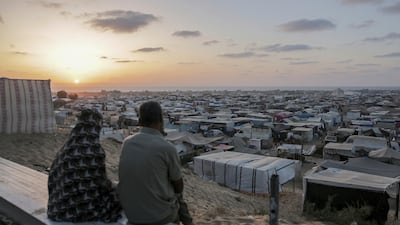Live updates: Follow the latest news on Israel-Gaza
The UN humanitarian co-ordinator for Gaza on Tuesday said 1.9 million people – more than 80 per cent of the population – have been displaced in the enclave amid the continuing Israeli bombardment of the south.
“Over one million people have been displaced once again, desperately seeking shelter and safety,” Sigrid Kaag told the UN Security Council. She said she was deeply concerned about reports of new evacuation orders in the area of Khan Younis.
The Israeli army ordered residents of several towns and villages in eastern Khan Younis to evacuate their homes on Monday, as tanks re-entered the area the military had vacated several weeks ago.
Ms Kaag emphasised that insufficient aid was reaching Gaza and stressed the need to open new crossings, particularly in the south, to prevent further escalation of the humanitarian crisis.
She also highlighted the importance of reopening the Rafah crossing between Gaza and Egypt.
“Military activity and the lack of safe routes inside Gaza continue to impact humanitarian operations. A near-total breakdown of civil order has further led to an environment of lawlessness and criminality,” Ms Kaag added.
Her comments came during her fourth briefing of the Security Council on the implementation of Resolution 2720, which mandates that all parties involved in the conflict “allow, facilitate and enable the immediate, safe, and unhindered delivery of large-scale humanitarian assistance directly to the Palestinian civilian population throughout the Gaza Strip”.
However, large-scale aid is still not reaching Palestinians in Gaza. The UN-backed Integrated Food Security Phase Classification (IPC) report last week indicated the Gaza Strip continues to face a high risk of famine.
Reinforcing the need for a full ceasefire, Ms Kaag said the war in Gaza had not merely created the most profound of humanitarian crises, “it has unleashed a maelstrom of human misery”.
“The health system has collapsed, schools destroyed and the disrupted education system threatens future generations,” she said.
“We cannot ask Palestinian civilians to put their futures on hold while they cling to their dignity under the most inhumane circumstances.”
She called for the beleaguered Palestinian Authority to play a critical role in the Gaza Strip.
“The Palestinian Authority is integral to planning for the implementation of Gaza's recovery and reconstruction and the international community must ensure the policy and authority's financial stability and support its reform, governance and other capacities needed to resume its responsibilities in Gaza,” she said.
Ms Kaag's mandate includes facilitating, co-ordinating, monitoring and verifying the humanitarian nature of all relief consignments delivered to Gaza by states not involved in the conflict.
Russia’s envoy to the UN Vasily Nebenzya said that despite Ms Kaag's careful wording regarding her involvement with conflict parties and the special humanitarian mechanism for Gaza, “the reality is that humanitarian access is not being ensured through the main channels for delivering assistance”.
He also said it was time to recognise that the maritime corridor between Cyprus and the Gaza Strip and the US-built temporary pier “never lived up to expectations”.
“Instead of building the pier,” Mr Nebenzya noted, “Washington could have demanded that Israel ease the blockade on Gaza and allow the entry of truly substantial aid volumes.”
Slovenia's ambassador to the UN, Samuel Žbogar, said starvation and famine in Gaza were “man-made” and “a choice”.
“A choice by Hamas who is willingly sacrificing its people rather than agreeing to a ceasefire...a choice by Israel not to fulfill its prime duty as the occupying power,” Mr Žbogar told council members.
The US called on Israel to take concrete steps to ensure the safety of humanitarian workers, reiterating that the best solution to the crisis is for Hamas to accept the ceasefire proposal, with which Israel is reportedly “on board”.



